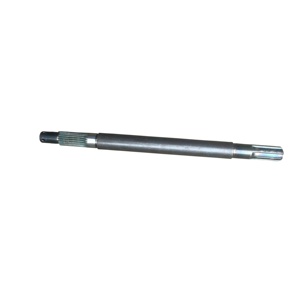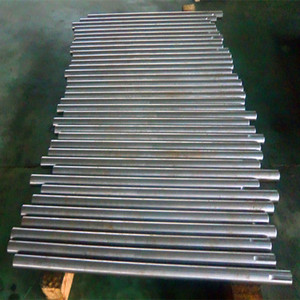(34740 products available)
















































































































































































A CNC shaft can come in various types, each playing a pivotal role in the functionality of machinery. Here are four common types of shafts in CNC machines:
CNC Drive Shaft
The drive shaft in a CNC machine helps to transfer torque and rotational power between two parts for driving. Usually made from strong metal materials, the drive shaft has a universal joint at either end. The universal joint helps to compensate for any misalignment that may occur between the connected parts.
CNC Stepper Motor Shaft
Stepper motors turn shafts in discrete steps, unlike traditional motors that provide continuous rotation. The torque output is high even at low speeds. The motor has a shaft connected directly or through a belt to the driven element. In some cases, the stepper motor has its rotor designed to hold and move small parts like slides or jigs.
CNC Idler Shaft
An idler shaft in a CNC machine serves to redirect or maintain tension in a drive belt. The shaft does not drive or impart any power to the belt. Nonetheless, it aids in the machine's efficient functioning by supporting the belt drive system. Typically, an idler shaft will have a bearing housing that supports two bearings. The bearing allows the drive belt to smoothly glide over it.
CNC Hollow Shaft
A hollow shaft has a lightweight build and consists of a thick-walled tube. It provides high stiffness without adding to the weight of the part. The design allows for wiring to pass through the shaft. A universal joint connects to another part to transmit torque, especially in cases where there is misalignment between the two connecting parts.
The shaft of a CNC machine comes with specific features for various applications. Most shafts are made of strong materials like stainless steel or alloy steel. In some cases, there's a protective coating over the shaft to prevent rust. Shafts come in standard lengths from 100 mm to 3000 mm. But custom lengths are possible if businesses order in bulk. Common diameters for shafts are between 20 mm and 60 mm. Larger or smaller diameters are possible with a custom order.
Sleeves are fitted on some CNC shafts to lengthen the shaft without changing its design. Known as CNC machine shaft extensions, sleeves can be clamped or glued to the shaft. The usual way is to clamp them. Sleeves are used when the length of the shaft is not known, but they may affect the accuracy of the machine. Depending on the CNC machine type, the coupling on the shaft helps connect other parts. Some common types of couplings are jaw, rigid, and helical gear couplings. Couplings are selected based on their torque capacity and load.
Over time, CNC shafts may get dirty, causing the machine's operation to slow down. It's important to keep the shafts and other parts clean. The type of cleaning will depend on the material of the shaft. A dry or wax-based cleaning method is recommended for steel and stainless steel shafts. Using a wet cleaning method will increase the chances of rust.
A dry method involves brushing off the dust or debris from the shaft. After brushing, a wax-based cleaner can be applied to the shaft with a soft cloth. When using the wax-based method, it's important to make sure the shaft is completely dry before putting it back into the CNC machine. For dirty hard-to-reach areas, a clean cloth and a small amount of wax-based cleaner can be used to clean those areas.
When cleaning shafts made of alloy steel or other metals, a small amount of rust remover can be used. The rust remover helps to keep the protective coating intact. It's important to dry the protective coating before starting to use the machine again.
The application scenarios for CNC shafts are diverse because these components can suit many machines and industries. Here are some of them:
Medical equipment manufacturing
CNC drive shafts are commonly used in medical equipment. The drive shaft allows the instrument to rotate, providing precise control over dosage delivery by pumps. Furthermore, some diagnostic devices may have CNC shafts for moving the sampling head or detection elements.
Textile machine
CNC machine shafts connect motors to spindles in the textile industry. They transmit the required torque and drive +spindle for efficient operation. As the backbone of the machine, shafts also support gears, pulleys, and knives, allowing flexible cutting and weaving of fabrics.
Industrial automation and robotics
Robots used in industrial automation work based on a motor's torque, which a drive shaft transmits. The shaft connects the motor to the robotic arm joints for transmitting rotational motion in an industrial setup.
CNC machining and manufacturing
Inherent to the operation of a CNC machine tool, shafts help cut, mill, drill, and perform other complex machining tasks. The shafts propagate the motor torque required for machining metal parts with high precision.
Food and beverage packaging systems
Soldering, conveyor, and capping machines in the food and beverage industry all have CNC shafts connected to motors for transmitting rotational movements. Conveyors use CNC shafts for sorted products, while capping machines use them for screw caps.
Aerospace and automotive part production
In the aerospace and automotive industries, CNC shafts help create light alloy components with high strength. These industries may use laser cutting CNC shafts or plasma to shape complex parts of vehicles with precision.
Sign manufacturing and LED display assembly
These kinds of applications usually use a small diameter CNC shaft that can assemble and produce luminous points. The shafts help operators join transparent tubular inserts, pipes, and other devices to manufacture variable signage.
The task of choosing the proper CNC shaft doesn't have to be burdensome. A simple checklist will make it as easy as A-B-C. First, examine the machine's size and weight. If there's a plan to make larger-than-life products or if a heavy-duty device is used, then it makes sense to go for a large-diameter shaft with a heavier gauge tubing material.
Secondly, consider the machine's forces and torques. With high cutting forces and torque comes the need for high tensile strength. If one's business requires CNC shafts to withstand big forces and torque, shafts made of alloy steel with keyways for hardened steel are better options.
Next, the precision required to make a product should be factored in when choosing a CNC machine shaft. Simple devices that don't require great precision can use shafts with average precision. On the other hand, high-precision devices will need shafts that have better diameter tolerances.
Fourthly, the method of production plays a big role in the choice of a CNC machine shaft. Custom devices will need custom shafts, so they should go for the ones made using the spindle method or the pipe method. Also, the production process used on the shaft affects its strength, precision, and cost.
Finally, coating and finishing should also be considered. Coatings like chrome and zinc platings protect the shaft from wear and tear and make it last longer. Don't forget to check the compatibility of the shaft material with the shaft's material. When CNC machine shaft materials and parts are compatible, they're bound to work together well and produce excellent results.
Q: What materials are typically used to make CNC shafts, and what are their pros and cons?
A: There are various types of CNC shafts with different uses. Therefore, the materials used may vary. The CNC machine shaft material commonly used for heavy loads and high impact is carbon steel. Its combination of hardness, strength, and resistance makes it a popular choice. Aluminum alloy is light and easy to work with, making it suitable for light-duty applications. Stainless steel is strong, rigid, and resistant to corrosion. It is preferable for jobs that require high precision. The wood shaft is used in woodworking projects. For the composite material, it is often a combination of metal and ceramic material with low friction properties.
Q: How to ensure compatibility with the existing CNC setup when selecting new machine shafts?
A: To ensure compatibility with the current CNC setup, it is wise to consider the diameter and length. They must be the same or have room for modification. Check the coupling, connectors, and gears to ensure they match with the existing system. Another important step is to consult the machine manufacturer. If possible, try out the new shafts in a test environment before mass production.
Q: What are the trends and innovations in CNC machine shaft technology, such as new materials or designs?
A: The common innovations of CNC shafts are the grade eight driveshafts, splined shafts, and Carbon Fiber Drive Shaft CNC. The Carbon Fiber Drive Shaft CNC has a low weight, impact resistance, and low coefficient of thermal expansion. More laser welding techniques have been introduced to improve connection methods. For carbon steel machine shafts, the material technology has made them stronger to take on higher torque.